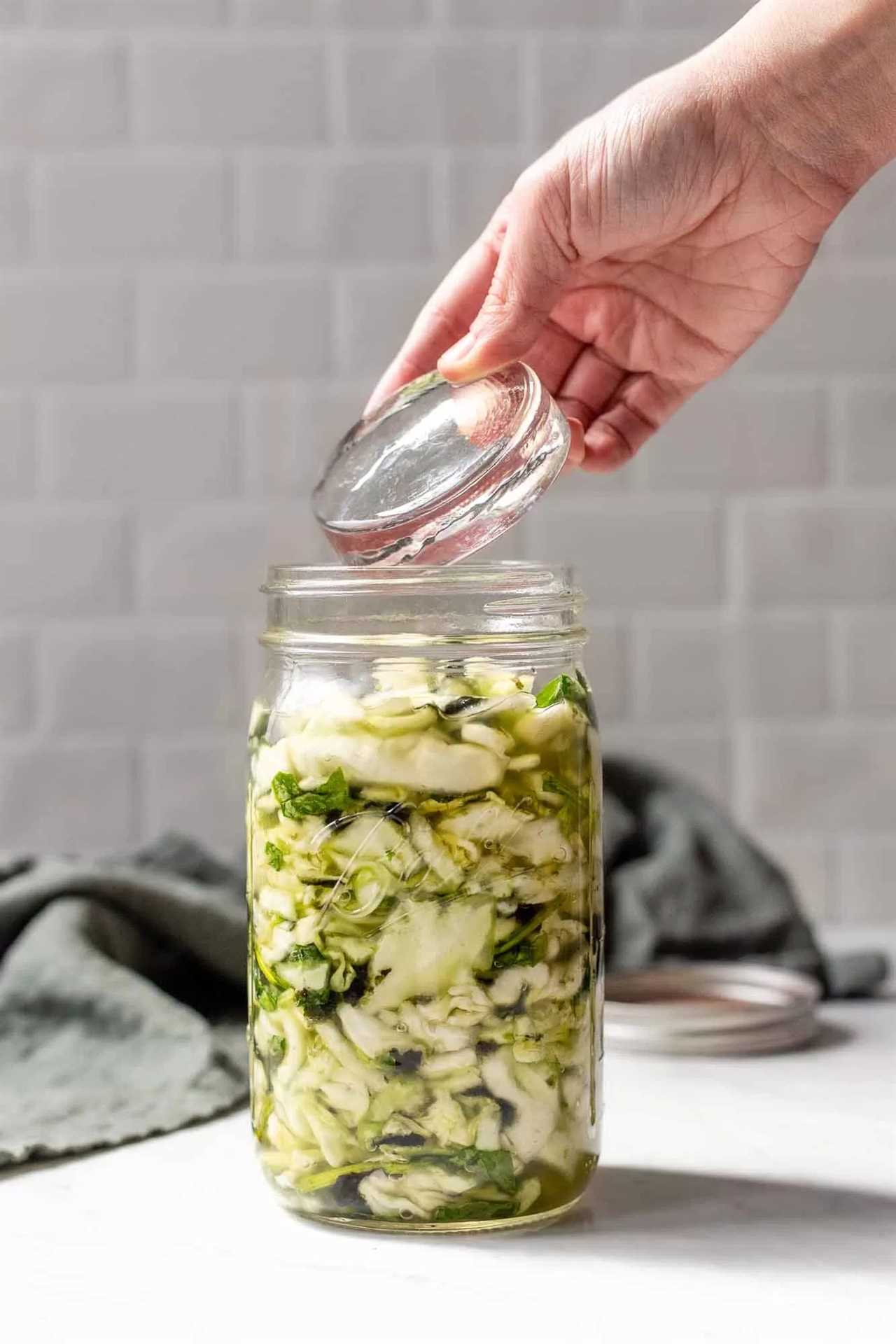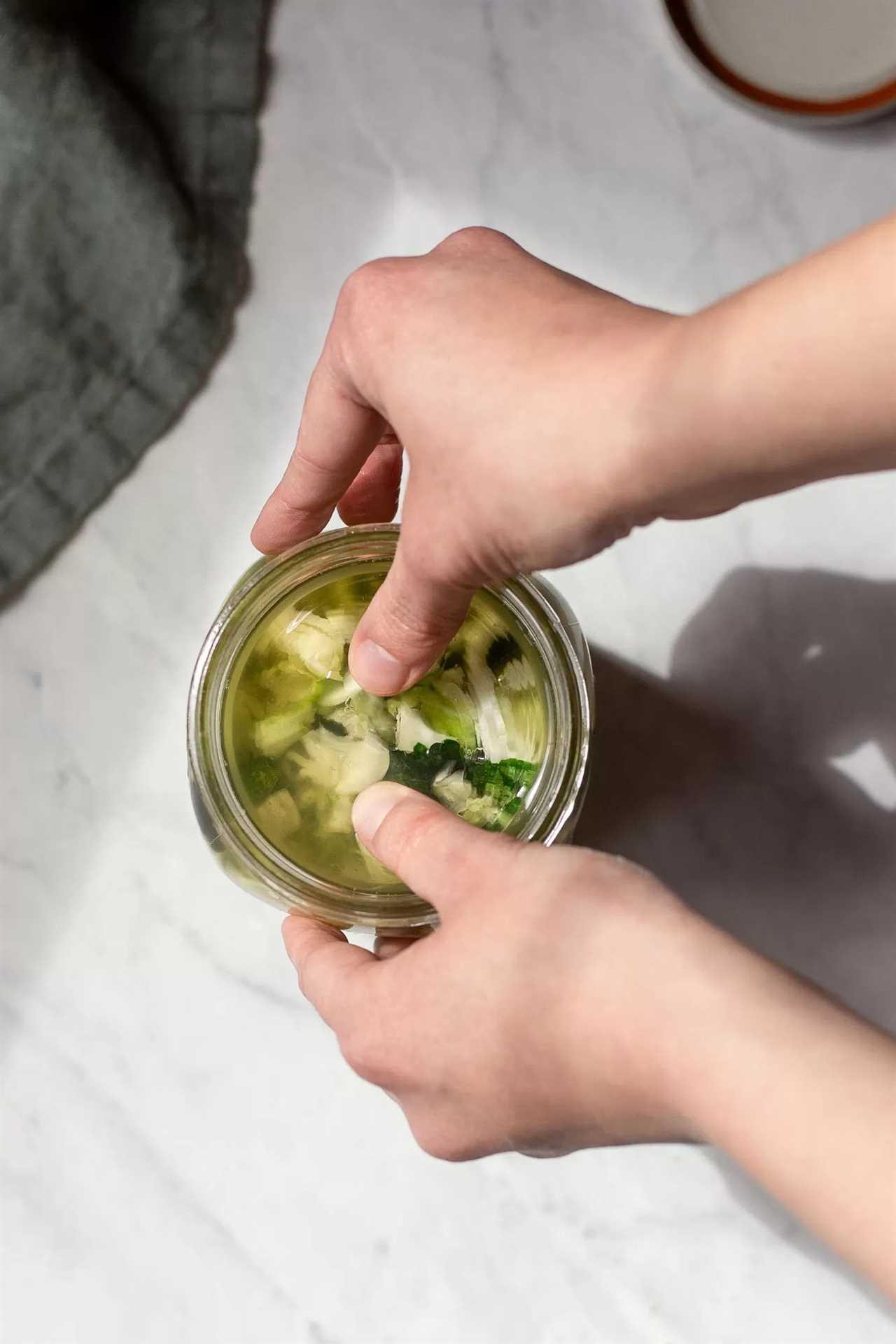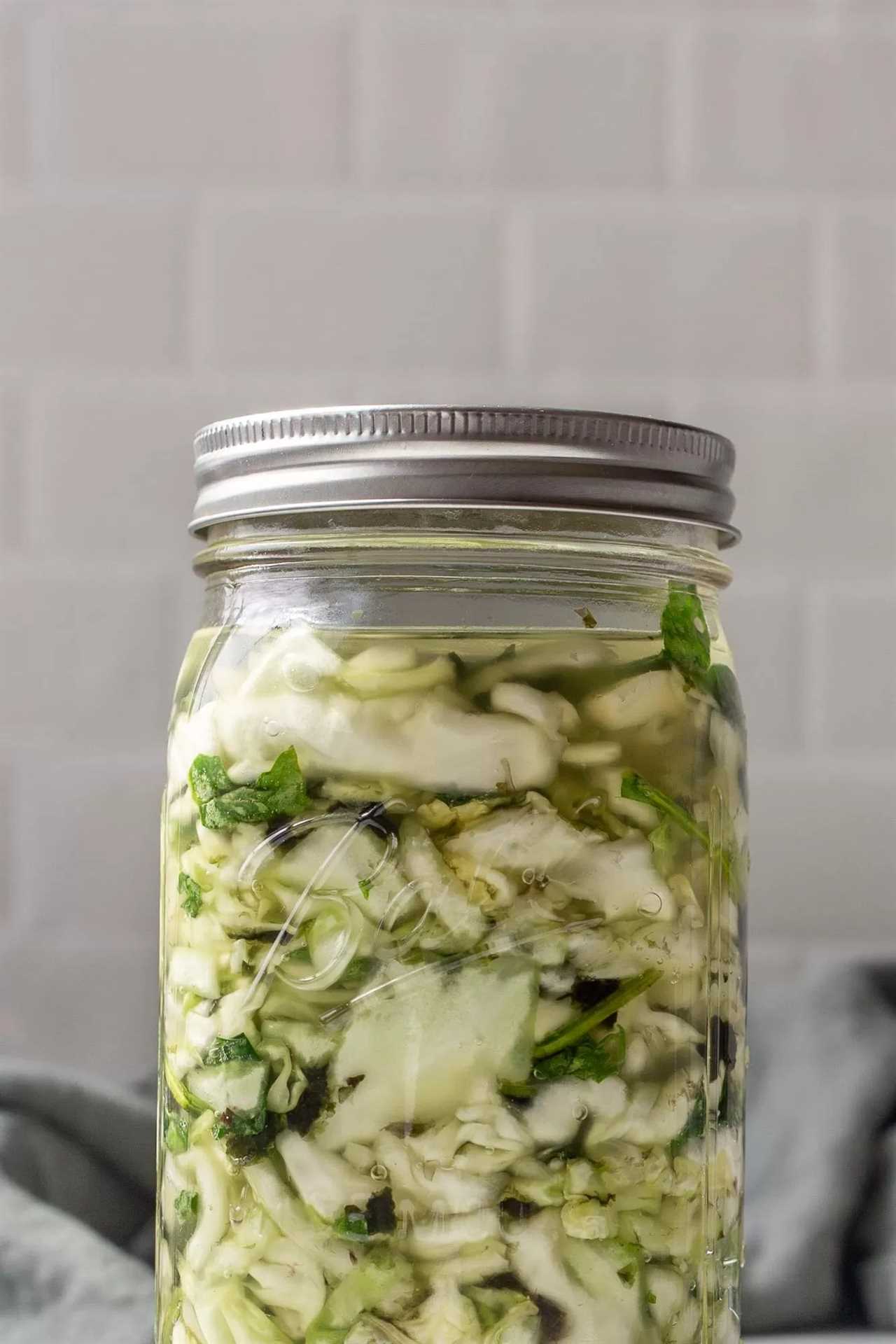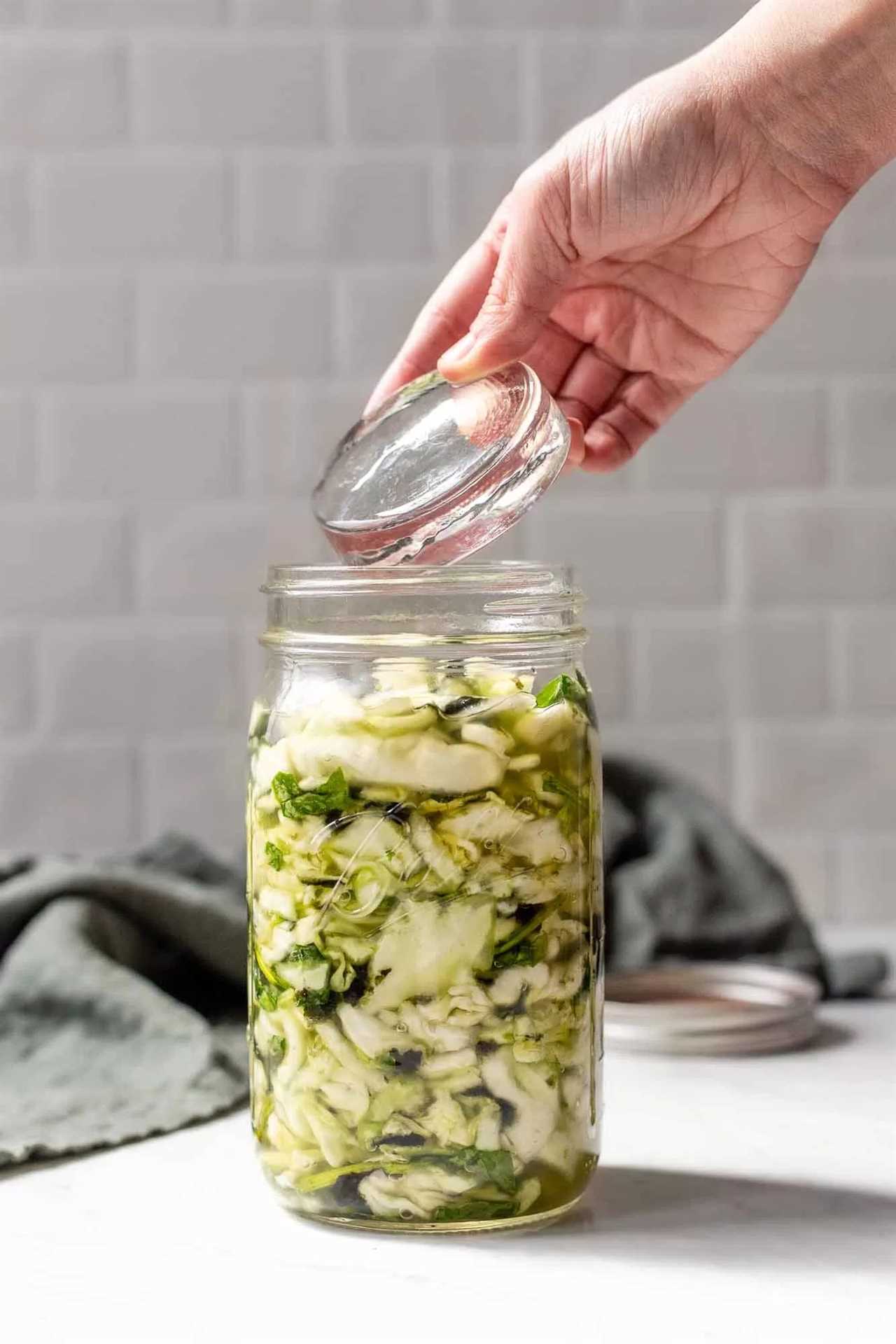There are many benefits of eating sauerkraut daily because probiotic foods contain probiotics, prebiotics, bioavailable vitamins, and bioavailable minerals. Enjoy my unique sauerkraut recipe that incorporates coconut water, kale, beet greens, seaweed, cabbage, and sea salt. Beneficial bacteria in sauerkraut transform these ingredients into bioavailable vitamins and minerals for optimal gut health. This recipe comes together in just 15 minutes and the fermentation process takes four weeks at room temperature.
How to Eat Sauerkraut for Gut Health
There are plenty of benefits of eating sauerkraut daily. Eating sauerkraut every day can help maintain regular and healthy digestion for two main reasons. First, sauerkraut provides natural probiotic bacteria to balance the gut microbiome. Second, sauerkraut contains a lot of enzymes, bioavailable nutrients, essential vitamins, and minerals. This is why I eat sauerkraut or kimchi every morning with breakfast. These foods help me maintain a healthy gut, but there’s more to it.
The microorganisms in your gut are essential for healthy digestion, but they are not the only factor. There are other aspects to proper digestion. Parts of your nervous and circulatory systems also help work with nerves, hormones, blood, and the other organs of your digestive system to efficiently digest the foods and liquids you eat and drink.
For all of these systems to work correctly in tandem with your gut microbiome, you have to supply your body with the right vitamins, minerals, and nutrients. A great way to give your body these necessary nutrients is to eat naturally fermented sauerkraut.
It’s easy to staring eating sauerkraut daily for gut health; incorporate it into plant-based recipes like these:
- Nutritious Chicken Caesar Salad with Brussels Sprouts
- Vegan German Sauerkraut Soup with Chickpeas and Mushrooms (Sauerkrautsuppe)
- Tempeh Reuben Sandwiches with Sauerkraut

What Vitamins are good for digestion?
The most important vitamins for gut health are B vitamins, vitamin C, vitamin A, and vitamin D; but we also have to think about minerals for healthy digestion. I’m not particularly eager to take supplements, and I enjoy giving my body everything it needs through real food. Thus, the top four minerals I always make sure I get enough of with every meal are magnesium, potassium, sodium, and calcium. Also, I am making sure I get enough iodine and vitamin C. Holistic nutrition encompasses more than just these vitamins and minerals. Still, I want to focus on these top four critical minerals for this blog recipe.
What Minerals are in Sauerkraut?
Sauerkraut is rich in vitamins and minerals when you make it with cabbage, salt, and water. Sauerkraut vitamins and minerals include:
- Vitamin C
- Vitamin K1
- Iron
- Folate
- Manganese
- Copper
- Potassium


Is sauerkraut high in magnesium?
The bacteria that ferment the cabbage into sauerkraut simply make vitamins and minerals already present in the ingredients more bioavailable. Therefore, if you want sauerkraut to be high in magnesium, the ingredients included in the sauerkraut need to be high in magnesium.
I decided a great way to boost essential minerals, like magnesium, would be to make a Mineral-Rich Fermented Sauerkraut. Here’s the breakdown of the ingredients I added to this recipe and why I added them:
- Fresh leafy beet greens = calcium and magnesium
- Sea salt = sodium
- Coconut water = potassium and magnesium
- Kale = vitamin C and calcium
- Shredded Cabbage = magnesium, potassium, and calcium
- Seaweed = iodine (necessary for thyroid function); the best seaweed to use would be kombu, but I used a nori sheet.
With all of these ingredients, this recipe is the most mineral-rich sauerkraut and great for your immune system. However, I want to note that this sauerkraut does not provide the total daily recommended value of essential minerals all by itself. Still, it is an excellent addition to breakfast for a boost of minerals to start the day.
How long should you ferment cabbage?
To learn all about the optimal fermentation time for sauerkraut, click here. You can taste test this sauerkraut at 14 days, but you should continue to ferment for 21 to 28 days. A three to four-week fermentation time will yield kraut with the most beneficial bacteria for digestive health.
If you follow all the directions and this timeline, you don’t need to worry about harmful bacteria. The ratios in my recipe ensure you can cover the cabbage with enough brine to keep everything submerged throughout fermentation.
Here are the fermentation conditions for this recipe:
- 4 weeks of fermentation
- Approximate 2.5% total salt concentration
- Room temperature (60-78° F)
- Final pH around 3.7
- Store in refrigerator after fermentation for up to 2 years

Supplies You’ll Need to Ferment Sauerkraut
Here are all the supplies you need to make this recipe:
- sea salt
- water (tap works fine, but if your tap water is questionable use filtered)
- 1-quart glass mason jar with lid
- a glass Fermentation Weightfit to the mason jar
- Metal mason jar screw band or Rust Free Plastic Screw Band
- Kitchen scale
More Recipe to Reap the Benefits of Eating Sauerkraut Daily
- How to Ferment Sauerkraut with Blueberries and Açaí
- How to Ferment Sauerkraut with Orange, Sesame, and Ginger
- Roasted Garlic Sauerkraut with Black Pepper
How to Make Mineral Rich Sauerkraut
There are many benefits of eating sauerkraut daily because fermented cabbage contains probiotics, prebiotics, bioavailable vitamins, and bioavailable minerals. Enjoy my unique sauerkraut recipe that incorporates coconut water, kale, beet greens, seaweed, cabbage, and sea salt. Beneficial bacteria in sauerkraut transform these ingredients into bioavailable vitamins and minerals for optimal gut health. This recipe comes together in just 15 minutes and takes four weeks of fermentation at room temperature.
- Prep Time: 10 minutes
- Fermentation time: 28 days
- Total Time: 672 hours 10 minutes
- Yield: 30 servings
- Category: Fermented Vegetables
- Method: Fermentation
- Cuisine: German
- Diet: Vegan
Ingredients
- 500 grams green cabbage
- 50 grams beet greens
- 5 grams seaweed
- 200 grams coconut water
- 19 grams sea salt
Instructions
- Wash your fermentation equipment (jar, weight, and lid). For this recipe, I suggest sterilizing the jar, lid, and weight with a little bit of vodka).
- Remove the outer leaves of your cabbage and lightly rinse with cool water. Using a knife, chop the cabbage to your desired thickness.
- Place your kitchen scale on the counter. Turn it on and set it to weigh in grams.
- Place a mixing bowl on your kitchen scale and tare/zero the scale.*
- Add the designated amounts of chopped cabbage, beet greens, seaweed, and coconut water into the bowl.
- Remove the bowl of cabbage from the scale and set it aside. Place a small, empty bowl on your scale and tare/zero the scale. Weigh out 19 grams of sea salt.
- Add the 19 grams of salt into the bowl with the cabbage, and mix with your clean hands. I mixed for about two minutes.
- Starting with the liquid, add the entire contents of the bowl into your mason jar, and pack everything down using a tamper, wooden spoon, or your hand.
- Place your glass fermentation weight in the jar, making sure to submerge the cabbage pieces and weight fully into the liquid. If you don’t have quite enough liquid, place your glass fermentation weight in the jar and submerge as much as possible. Over the next 12 hours, the cabbage should release more liquid and you can press down your fermentation weight below the brine.
- Secure the standard mason jar lid to the mason jar.
- Ferment for at least 21 days before storing in the fridge.
- In the first week of fermentation, carefully burp the jar daily to release the gas.
Notes
This recipe works best with a 32-ounce jar
*Taring/zeroing the scale with a container on it subtracts the weight of the container, allowing you to weigh only what is added to the container. After taring/zeroing the scale, it should read 0.0 with the container on it.
100 grams water = 100 mL water
Keywords: sauerkraut, fermented vegetables
-------------------------
By: Kaitlynn Fenley
Title: The Benefits of Eating Sauerkraut Daily
Sourced From: cultured.guru/blog/the-benefits-of-eating-sauerkraut-daily?utm_source=rss&utm_medium=rss&utm_campaign=the-benefits-of-eating-sauerkraut-daily
Published Date: Wed, 09 Mar 2022 23:53:09 +0000
Did you miss our previous article...
https://biohackersnews.com/gut-health/easy-greek-meatballs-with-tzatziki-sauce-dressing
.png)






